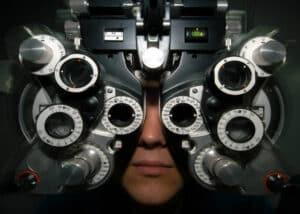You need an eye exam. Is it best to see an Optometrist or Ophthalmologist?

Would it be best to see an Optometrist or Ophthalmologist?
Most patients see an eye doctor annually (or more often as needed). But should you be seen by an Optometrist or Ophthalmologist? Both terms sound awkward yet somehow similar. They both mean ‘Eye Doctor” so, speaking loosely, the terms are similar, though they are not really synonyms. Your local optometrist is a primary care eye doctor, while your ophthalmologist is a surgeon. Both are quite different from an Optician, which is a glasses sales, fabrication, and repair specialist.
Let’s dig a little deeper though. No matter if you work with an optometrist or ophthalmologist, both are highly trained clinicians, and both optometrists and ophthalmologists are eye specialists with doctoral degrees. Yet their focus is typically somewhat different. Despite the differences highlighted below, there is actually a good deal of overlap as well. It is worth mentioning early on in this post that there are many medical practices that employ both optometrists AND ophthalmologists; generalists and specialists working together as a team, under one roof. In fact, Dr. Mark Cannon (of Cannon EyeCare) worked at a Seattle-Metro ophthalmology clinic for over a year shortly after graduating from optometry school.
What can an optometrist do?
So what can optometrists do? In the medical industry, the terminology related to what a doctor is licensed to do is called their ‘scope of practice’. Optometrists are licensed to diagnose and manage ocular disease, and to use both ocular and systemic (oral) prescription drugs to do so. Eye doctors like the optometrists at Cannon EyeCare will also manage eye injuries like corneal abrasions, inflammation on the front of the eye (keratitis, blepharitis, etc) or inside the eye (iritis), and are often quite skilled at managing dry eye. They can also handle all but the most severe cases of glaucoma and macular degeneration. Optometrists are often seen as the doctors who can set you up with glasses or contact lenses. While it’s true that you will likely get a great glasses prescription from your local optometrist, they can typically do much more. That being said, some optometrists are medically oriented, and others just want to do the basics and end up working at an America’s Best or CostCo.
How are ophthalmologists different?
Ophthalmologists are medical doctors (MDs) or doctors of osteopathy (DOs) who then specialized in eye surgery. The majority of these eye doctors are quite specialized, working on one particular part of the eye in their surgical practice (cornea, cataracts, or Retina). General ophthalmologists are definitely around in the Seattle Metro, but it is more common to find an eye surgeon with a ‘general’ focus in a more rural setting. Even the general ophthalmologists in the Seattle area would refer you to another ophthalmologist if you needed retinal surgery. The skills and equipment needed for that type of care can only be found in the offices of a retinal specialist…another type of ophthalmologist. Circling back to the scope of practice for various eye doctors, ophthalmologists have a broader scope than optometrists. While ophthalmologists are surgeons who like to perform surgery, these eye doctors can perform routine eye exams as well. To further muddy the waters, optometrists often work in the offices of retinal specialists. One great example is Dr. Landon Jones, OD, FAAO who works at NorthWest Eye Surgeons.
Dr. Jones is an optometrist and a very specialized doctor who does not see patients for things like primary care visits or contact lens fittings. He is an optometrist who figures out if patients with retinal health problems like severe diabetic retinopathy, retinal detachment or wet AMD are on track and just need further follow up or if they need to see the surgeon soon.
If you are in your 50s or 60s you may be feeling like your vision is not as good as it was in recent years. Perhaps your eye doctor has mentioned cataracts to you. Another good example that illustrates the different roles played by various eye doctors is the management of cataracts. Your optometrist (primary care eye doctor) will see you for yearly exams as you move through your 50s and into your 60s. When your cataracts (clouding of the lens INSIDE your eye) gets to a point that new glasses won’t make you see well enough to see the things you need to see, then your optometrist will refer you to a surgeon (an ophthalmologist) that they trust. The ophthalmologist will handle the actual eye surgery. In most scenarios, you will do most of the pre-operative and post-operative visits with your Optometrist.
In summary, most people with relatively healthy eyes don’t need a surgeon for their eye health exams. They need a primary care eye doctor who can let them know if general eye health is on track or not. That same doctor will keep their glasses and contact lens prescriptions tuned up. In most scenarios, the best doctor to choose for such care is an optometrist. Your local primary care eye doctor will let you know when something has come up that requires a surgical consult.
Sincerely, Dr. Mark J. Cannon, optometrist @ Cannon EyeCare (at Market Optical) in Seattle, Washington

Would it be best to see an Optometrist or Ophthalmologist?
Most patients see an eye doctor annually (or more often as needed). But should you be seen by an Optometrist or Ophthalmologist? Both terms sound awkward yet somehow similar. They both mean ‘Eye Doctor” so, speaking loosely, the terms are similar, though they are not really synonyms. Your local optometrist is a primary care eye doctor, while your ophthalmologist is a surgeon. Both are quite different from an Optician, which is a glasses sales, fabrication, and repair specialist.
Let’s dig a little deeper though. No matter if you work with an optometrist or ophthalmologist, both are highly trained clinicians, and both optometrists and ophthalmologists are eye specialists with doctoral degrees. Yet their focus is typically somewhat different. Despite the differences highlighted below, there is actually a good deal of overlap as well. It is worth mentioning early on in this post that there are many medical practices that employ both optometrists AND ophthalmologists; generalists and specialists working together as a team, under one roof. In fact, Dr. Mark Cannon (of Cannon EyeCare) worked at a Seattle-Metro ophthalmology clinic for over a year shortly after graduating from optometry school.
What can an optometrist do?
So what can optometrists do? In the medical industry, the terminology related to what a doctor is licensed to do is called their ‘scope of practice’. Optometrists are licensed to diagnose and manage ocular disease, and to use both ocular and systemic (oral) prescription drugs to do so. Eye doctors like the optometrists at Cannon EyeCare will also manage eye injuries like corneal abrasions, inflammation on the front of the eye (keratitis, blepharitis, etc) or inside the eye (iritis), and are often quite skilled at managing dry eye. They can also handle all but the most severe cases of glaucoma and macular degeneration. Optometrists are often seen as the doctors who can set you up with glasses or contact lenses. While it’s true that you will likely get a great glasses prescription from your local optometrist, they can typically do much more. That being said, some optometrists are medically oriented, and others just want to do the basics and end up working at an America’s Best or CostCo.
How are ophthalmologists different?
Ophthalmologists are medical doctors (MDs) or doctors of osteopathy (DOs) who then specialized in eye surgery. The majority of these eye doctors are quite specialized, working on one particular part of the eye in their surgical practice (cornea, cataracts, or Retina). General ophthalmologists are definitely around in the Seattle Metro, but it is more common to find an eye surgeon with a ‘general’ focus in a more rural setting. Even the general ophthalmologists in the Seattle area would refer you to another ophthalmologist if you needed retinal surgery. The skills and equipment needed for that type of care can only be found in the offices of a retinal specialist…another type of ophthalmologist. Circling back to the scope of practice for various eye doctors, ophthalmologists have a broader scope than optometrists. While ophthalmologists are surgeons who like to perform surgery, these eye doctors can perform routine eye exams as well. To further muddy the waters, optometrists often work in the offices of retinal specialists. One great example is Dr. Landon Jones, OD, FAAO who works at NorthWest Eye Surgeons.
Dr. Jones is an optometrist and a very specialized doctor who does not see patients for things like primary care visits or contact lens fittings. He is an optometrist who figures out if patients with retinal health problems like severe diabetic retinopathy, retinal detachment or wet AMD are on track and just need further follow up or if they need to see the surgeon soon.
If you are in your 50s or 60s you may be feeling like your vision is not as good as it was in recent years. Perhaps your eye doctor has mentioned cataracts to you. Another good example that illustrates the different roles played by various eye doctors is the management of cataracts. Your optometrist (primary care eye doctor) will see you for yearly exams as you move through your 50s and into your 60s. When your cataracts (clouding of the lens INSIDE your eye) gets to a point that new glasses won’t make you see well enough to see the things you need to see, then your optometrist will refer you to a surgeon (an ophthalmologist) that they trust. The ophthalmologist will handle the actual eye surgery. In most scenarios, you will do most of the pre-operative and post-operative visits with your Optometrist.
In summary, most people with relatively healthy eyes don’t need a surgeon for their eye health exams. They need a primary care eye doctor who can let them know if general eye health is on track or not. That same doctor will keep their glasses and contact lens prescriptions tuned up. In most scenarios, the best doctor to choose for such care is an optometrist. Your local primary care eye doctor will let you know when something has come up that requires a surgical consult.
Sincerely, Dr. Mark J. Cannon, optometrist @ Cannon EyeCare (at Market Optical) in Seattle, Washington
Pike Place Office
1906 Pike Pl Unit 8-b,
Seattle, WA 98101
University Village Office
2602 NE University Village St,
Seattle, WA 98105
Pike Place Office Hours
Monday
Closed
Tuesday
10:00 am - 5:00 pm
Wednesday
Closed
Thursday
10:00 am - 5:00 pm
Friday
10:00 am - 5:00 pm
Saturday
10:00 am - 5:00 pm
Sunday
Closed
University Village Office Hours
Monday
10:00 am - 6:00 pm
Tuesday
10:00 am - 6:00 pm
Wednesday
10:00 am - 6:00 pm
Thursday
10:00 am - 6:00 pm
Friday
10:00 am - 6:00 pm
Saturday
10:00 am - 6:00 pm
Sunday
Closed
